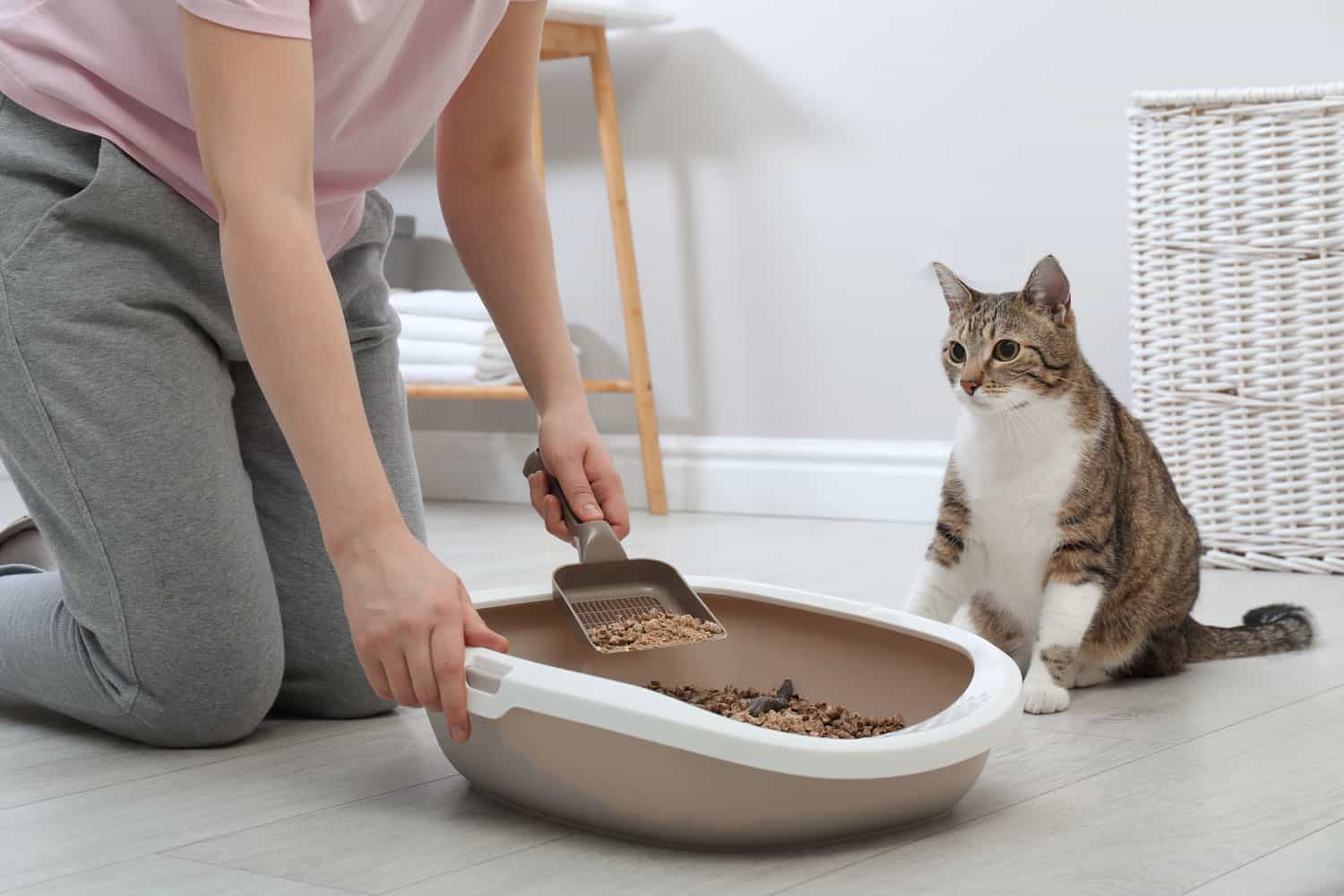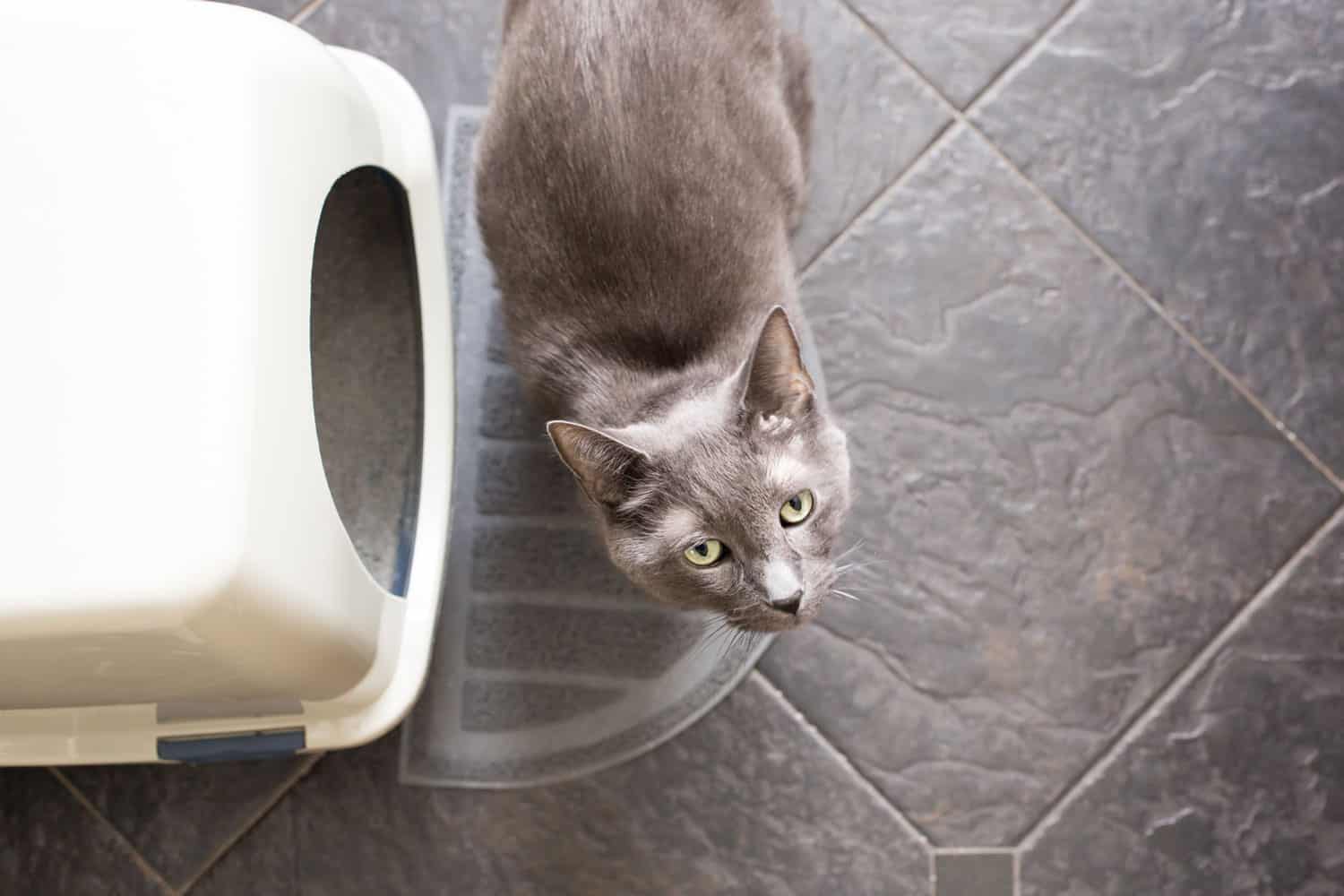Have you ever heard your cat growling in the litter box? It's a behavior that can be both amusing and puzzling, but our research shows that it's nothing to fear.
We've conducted thorough research to uncover why cats growl in the litter box - from medical issues to territorial behavior.

Our findings will help you better understand your furry friend's mysterious behavior and put your mind at ease.
If your cat continues to growl in the litter box, it could be a sign of discomfort or pain while urinating or defecating.
Alternatively, it could be a territorial behavior, especially in multi-cat households.
But don't worry; we've got you covered. Read on to discover what your cat is trying to tell you and learn how to address any issues.
Trust us, your furry friend will thank you for it!
Reasons for Growling
Growling while using the litter box is often a sign that something is amiss with your feline friend.
Whether it's a medical issue causing physical discomfort or a behavioral aspect rooted in territoriality, identifying the reason is the first step toward a solution.
Keep reading to delve into the two most common causes for this unusual behavior.
Reason #1: Medical
One common reason for litter box growling is that your cat is experiencing pain or discomfort when trying to eliminate.
Conditions like constipation, diarrhea, urinary tract infections, and bladder stones can all cause a cat distress when using the litter box.
The act of squatting to urinate or straining to pass stool can aggravate these medical issues.
The pain and discomfort then prompt the cat to vocalize with a growl or cry.
Any consistent change in litter box habits combined with growling warrants a veterinary visit to diagnose and treat the underlying condition.
Reason #2: Territorial Behavior
Cats may growl in the litter box even when healthy due to territorial behavior. The litter box represents a vulnerability for cats as they eliminate. Cats feel the need to protect this space from perceived threats.
In multi-cat households, competing for litter box access can cause territorial disputes.
One cat may growl to warn the other cats away and establish dominance over the litter box. Sudden changes like adding a new pet can also trigger resource guarding.
Cats may also want privacy and growl when sensing their personal space is invaded. Understanding typical cat behavior helps make sense of litter box growling.
Signs of a Serious Issue
While some litter box growling may be normal cat behavior, certain red flags warrant prompt medical attention. Contact your vet if you notice any of the following:
- Difficulty or straining while urinating/defecating
- Blood in urine or stool
- Frequent trips to the litter box with little output
- Excessive licking around genitals or hindquarters
- Litter box avoidance
- Urinating or defecating outside of the litter box
- Vocalizations other than growling, such as crying out
- Changes in appetite or water intake
- Fevers, lethargy, or other signs of illness
These symptoms indicate potentially serious urinary tract or digestive conditions that require veterinary care.
Catching and treating medical problems early vastly improves the prognosis and saves cats from unnecessary suffering.
In mild cases or with intermittent growling, try scheduling a routine vet visit for an examination and baseline bloodwork to rule out issues.
But if you observe multiple red flags or dramatic changes in elimination habits in tandem with growling, seek prompt veterinary attention. Do not delay.
Solutions and Prevention
Appropriate interventions can significantly affect whether your cat's litter box growling is due to a medical condition or territorial behavior.
The key is to pinpoint the cause to apply the most effective solution.

As you'll see, medical issues typically require veterinary treatment, while behavioral challenges may be addressed through environmental changes.
Read on to explore tailored approaches for both scenarios.
Solution #1: Addressing Medical Causes
If a medical issue is causing your cat to growl in the litter box, treatment from your vet is key. Treatment plans will depend on the specific condition. For example:
- Inflammation from UTIs or bladder infections is treated with antibiotics. Pain medication may also be prescribed.
- Bladder stones often require surgery for removal, but prescription diets can help prevent recurrence.
- Constipation is treated by increasing fiber and water intake. Laxatives or stool softeners may be used.
- Arthritis is managed through joint supplements, anti-inflammatories, weight loss, gentle exercise, and padded litter boxes.
Promptly treating the underlying medical issue will alleviate associated litter box discomfort and growling. Follow your vet's treatment instructions closely.
Solution #2: Managing Territorial Behavior
For cats growling due to territorial behavior, adjustments to their litter box and environment can help prevent conflicts:
- Provide one more litter box than the number of cats—place boxes in separate quiet locations.
- Use covered boxes or curtains for enhanced privacy and security.
- Place a pheromone diffuser near the litter box to promote calmness.
- Reward and praise calm litter box behavior with treats and affection.
- Clean boxes frequently and replace litter regularly to avoid resource guarding.
Satisfying a cat's need for a clean, comfortable, private litter box minimizes territorial stress and related growling. Consult a cat behaviorist for additional guidance on resolving conflicts.
When to Seek Professional Help
In some cases of persistent litter box growling, it is best to seek professional help from a veterinarian or cat behaviorist. Seek help from a vet if:
- Medical causes are suspected based on associated symptoms
- Growling is frequent and severe
- Litter box avoidance, accidents, or straining occur
- Treatment attempts do not resolve the behavior
A vet can diagnose and treat medical conditions and refer you to a behaviorist if needed. Seek help from a certified cat behaviorist if:
- No medical cause is found, but growling persists.
- Territorial disputes are ongoing despite adjustments.
- Your cat seems anxious, depressed, or stressed
- You need help interpreting your cat's behaviors
A cat behaviorist will assess your cat's behaviors, environment, and relationships with other pets.
They can provide customized strategies for reducing anxiety and properly resolving territorial conflicts between household cats.
Cat Communication Explained
Cats have an elaborate range of vocalizations to communicate messages. Growling, an ominous low rumble, often conveys aggression, fear, or a warning.
Cats often exhibit body language like flattened ears, arched backs, swishing tails, and enlarged pupils when growling.
Context offers clues to interpret the meaning behind a growl. In the litter box, it frequently signals pain/discomfort or territorial behavior related to that vulnerable location.
Other times, growling may indicate a cat's boundaries have been crossed, like during unwanted petting.
While growling can sound scary, it is simply a cat communicating their needs. With proper care and respect for their signals, peaceful coexistence is possible.
Understanding your cat's unique personality and sensitivities helps provide an environment where growling is rarely needed.
Overview Of Cat Growling In The Litter Box
Hearing mysterious growls coming from the litter box can be confusing and concerning for cat owners. However, this common behavior is usually a sign your cat is trying to communicate with you.
Growling while eliminating generally signals discomfort, pain from a medical condition, or territorial behavior in multi-cat homes. Regardless of the cause, it's important not to punish or startle a growling cat in the litter box.
Instead, be proactive about identifying triggers. Rule out health issues with your vet and make any necessary adjustments to the litter boxes.
Provide multiple private litter boxes in peaceful locations. Use pheromones and positive reinforcement to ease tensions.
While easier said than done, resist scolding or approaching a growling cat in the litter box, as this will only amplify their stress. Patience, care, and understanding will go a long way to help both you and your cat.
If litter box growling persists despite your best efforts, consult a vet or cat behaviorist.
With some detective work and dedicated care, you can get to the root of the behavior and help your cat feel more comfortable in their litter box again.
More like this: Why Does My Cat Throw Up After Using The Litter Box?



